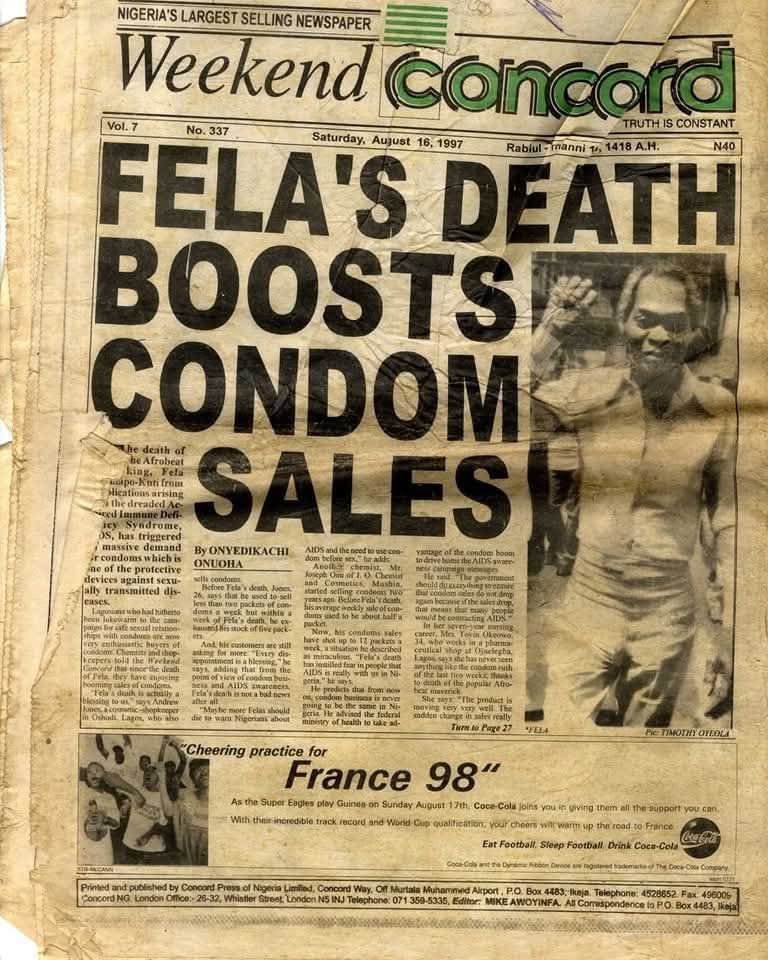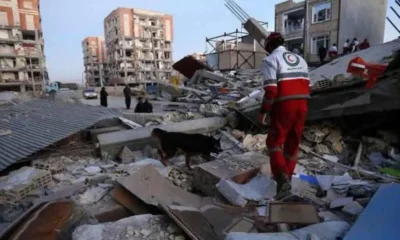NEWS
“Fela’s Death Boosts Condom Sales” – The AIDS Wake-Up Call Nigeria Couldn’t Ignore

On August 16, 1997, Weekend Concord ran a striking headline: “Fela’s Death Boosts Condom Sales.” It was bold, jarring, and brutally honest. Just two weeks earlier, Nigeria had been stunned by the announcement that Afrobeat icon Fela Anikulapo Kuti had died from AIDS-related complications.
But beyond mourning a musical revolutionary, the country was forced into a moment of reckoning—about health, responsibility, and the cost of denial.
In life, Fela was a symbol of unapologetic rebellion—against government oppression, colonial legacies, and moral conservatism. His famed Kalakuta lifestyle, complete with multiple partners and defiant hedonism, was as much a protest as it was a personal creed. So when his brother, Dr. Olikoye Ransome-Kuti—a respected former Minister of Health—made the shocking revelation that Fela had succumbed to AIDS, the symbolism was too heavy to ignore. It struck at the core of a society that was still largely silent, stigmatizing, or in denial about the virus.
The surge in condom sales in the immediate aftermath wasn’t just a market response—it was a cultural shift. Suddenly, HIV/AIDS wasn’t just a foreign disease talked about in abstract; it had taken down a national titan. And for many Nigerians, especially the youth who idolized Fela’s freedom, the threat became real.
At a time when public health campaigns struggled to break through religious and cultural taboos, Fela’s death inadvertently became the most powerful HIV awareness campaign in the country. Clinics and pharmacies reported a sharp increase in condom purchases. Churches and mosques began addressing the epidemic with renewed urgency. And in homes, quiet conversations began to replace years of silence and shame.
This rare moment of collective introspection came not from a government initiative or a donor-funded NGO project—but from the public grief over a man who had, ironically, lived on his own terms until the very end.
In retrospect, the Weekend Concord headline captured more than a spike in product sales. It captured a national pivot—from denial to awareness, from myth to reality. Fela’s death, tragic as it was, forced Nigeria to look AIDS in the face. And for a brief moment, people listened.
Almost three decades later, that moment stands as a reminder: sometimes, it takes the fall of a giant to shake a nation awake.
Discover more from Asiwaju Media
Subscribe to get the latest posts sent to your email.
-

 NEWS4 days ago
NEWS4 days agoBenue Tragedy: Nigerian Woman Mourns After Losing Five Children and Mother in Yelwata Massacre
-

 ENTERTAINMENT6 days ago
ENTERTAINMENT6 days agoRyan Taylor Claps Back At Fan Who Compared His Daughter To Ex-Fiancée DJ Cuppy
-

 NEWS5 days ago
NEWS5 days agoOkpuitumo Abandoned While Ikwo Politicians Feast on Power — Chika Amaga
-

 POLITICS5 days ago
POLITICS5 days agoVideo of Ebonyi Lawmaker Firing Gun in Public Sparks Outrage
-

 NEWS5 days ago
NEWS5 days agoBenue Bleeds While Tinubu Talks Reconciliation: Is the Pogrom a Cover for a Political War?
-

 EDITORIAL5 days ago
EDITORIAL5 days agoThe Benue Massacres and Nigeria’s Endless Failure to Protect Its People
-

 NEWS4 days ago
NEWS4 days agoChief of Defense Staff, Gen Musa Backs Benue Youth Vigilantes, Donates ₦150m for Yelewata Victims
-

 POLITICS4 days ago
POLITICS4 days agoNwali Celebrates Kelechi Igwe at 55, Hails His Impactful Legacy
-

 NEWS6 days ago
NEWS6 days agoReal Warri Pikin Announces She’s Expecting Fourth Child With Heartfelt Father’s Day Post
-

 FOREIGN4 days ago
FOREIGN4 days agoNetanyahu Says Killing Iran’s Supreme Leader Could End Ongoing War
-

 ENTERTAINMENT4 days ago
ENTERTAINMENT4 days agoDaddy Freeze Reveals He Received Death Threats for Criticizing Nigerian Pastors
-

 NEWS4 days ago
NEWS4 days agoBenue Man Loses 20 Family Members In Yelwata Attack, Says Killers Burnt His Brothers Alive






















